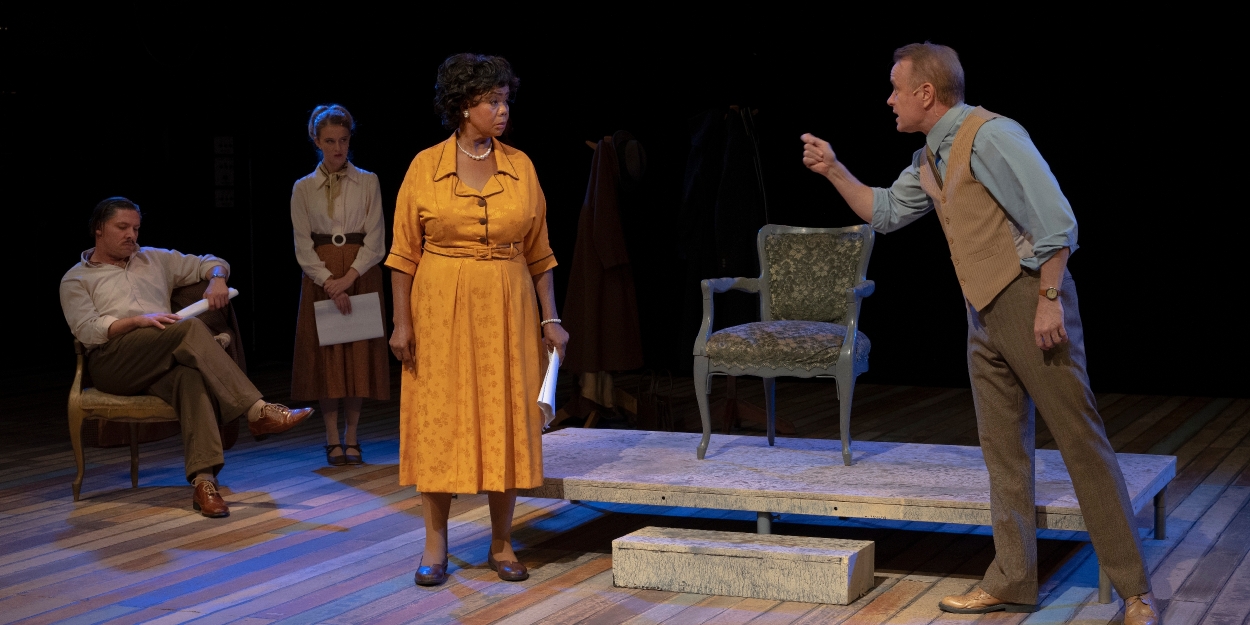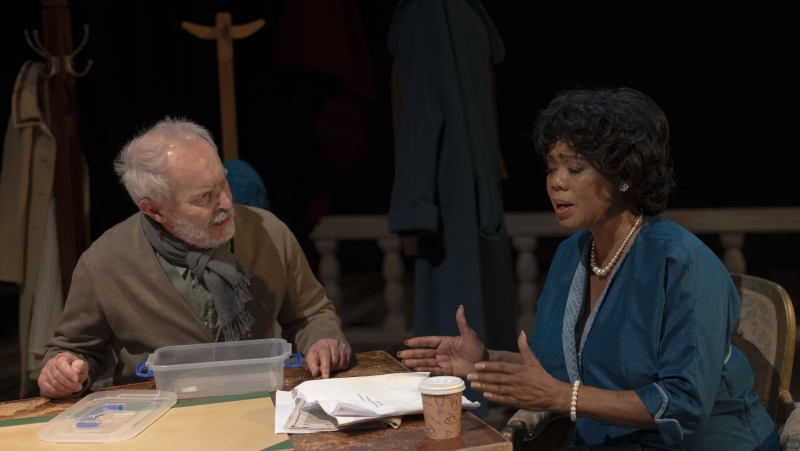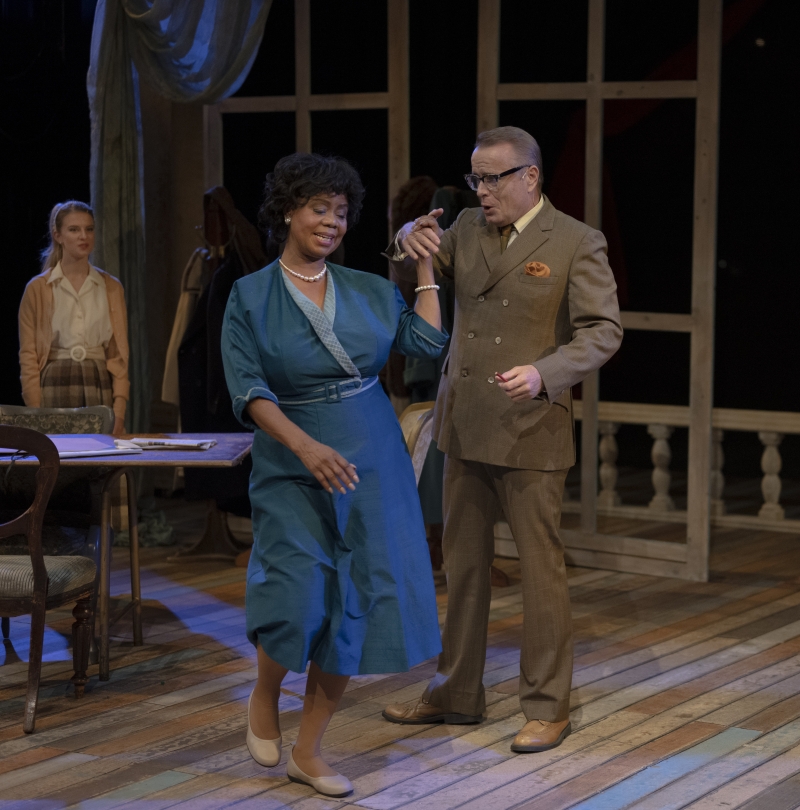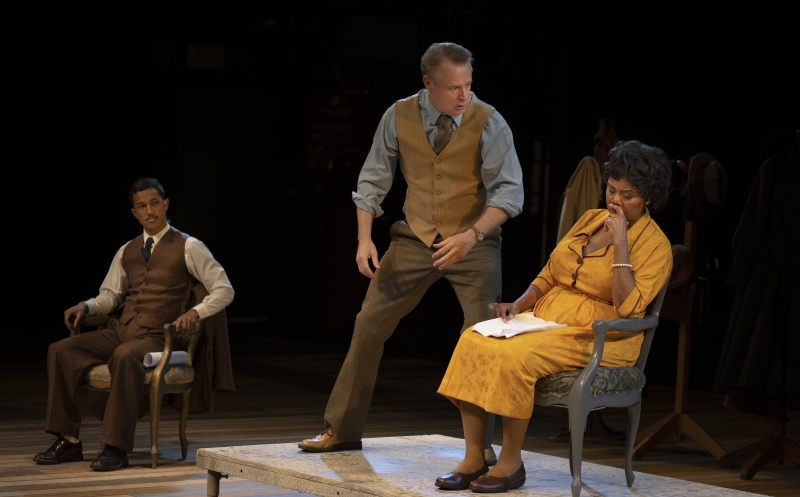Review: TROUBLE IN MIND at the Flipside Provides Hilarious and Tragic Social Commentary
This play-within-a-play was first staged in 1955.

I’ve always loved seeing plays at the Flipside at the Baxter. Something about observing a production performed in the actual backstage area of the theatre makes me feel like I’m on hallowed ground – I’m somewhere that is sacred, special and usually off limits to the public. These feelings became even more heightened during TROUBLE IN MIND – which itself takes place on Broadway, where theatre makers (some black and some white) rehearse for a play in the 1950s.
TROUBLE IN MIND, first staged off-Broadway in 1955 by celebrated playwright Alice Childress was written during the civil rights movement in the States. Despite the seventy years that have passed, the play remains deeply relevant and poignant – in some ways disappointingly so.
The production is extra ‘meta’ in that the play-within-the-play is itself commenting on racial dynamics in America at the time. Al Manners, the Director, is expertly brought to life by Antony Coleman. Coleman delivers a knockout performance as the tyrannical Manners, who is hailed as a theatrical genius. He is electric onstage. Manners’ cast of six is portrayed by Thembi Mtshali-Jones, Roystin Stoffels, Adrian Collins, Lyle October, Awethu Hleli, and Alyssa van Reenen. Additionally, Henry, the theatre’s caretaker, is played by Nicky Rebelo and Eddie, the Director’s assistant, is portrayed by Daniel Newton.

Each actor is outstanding. While I cannot provide in-depth commentary on every actor, each deserves a quick mention. Mtshali-Jones, as the play-within-a-play’s leading lady, delivers a performance full of conviction. It is a triumph to watch Wiletta find her voice and honour her integrity despite the sexism and racism that she constantly faces as a black actress.
I adored Stoffels as Sheldon – a character struggling with his own internalised racism. His range is impressive: he nails his comedic lines (he gave me the biggest laugh of the show) while his disturbing monologue about the witnessing of a lynching is hauntingly tragic. I really enjoyed watching the nuanced and dramatic elements of Stoffels’ performance.
I loved October’s portrayal of John Nevins. I have seen October in various productions and, to me, this is his best: a layered and textured performance (plus he nails that accent!).
Newton is hilarious as the klutzy, awkward stagehand. Hleli as the confident Milly delivers a performance that is simultaneously self-assured, sassy and vulnerable. Van Reenen’s ‘sweet as pie’ naiveite in her portrayal of Judy is the perfect embodiment of a well-meaning yet often oblivious white woman, who fancies herself an ally. Adrian Collins is convincingly self-serving, slimy and authoritative as Bill.
One of my favourites is Rebelo’s Henry. Henry is interesting: he is the most sympathetic white character in the play, but he too is a minority. As an Irishman in the States, he is often dismissed as ‘less than’ by Manners, and treats Wiletta with a respect that is neither performative nor affected. Rebelo is fabulous – charming and adorably funny, if not always (completely) lucid, Henry understands more than most give him credit for. Rebelo gives Henry a depth that is ‘shown’ as opposed to ‘told’: this character has faced oppression as well.

The production team of TROUBLE IN MIND, led by Mdu Kweyama’s innovative and compelling direction, has made the inspired decision to leave the ‘back’ of the Flipside revealed – so that we can see into the actual auditorium of the (Pam Golding) Theatre for some of the production. The result is enchanting. It also blurs the line between the play and real life: what is make believe? What is fiction and what is reality? The answer is complicated.
Admittedly, it’s difficult to pen a review of TROUBLE IN MIND and that’s because it does so much. It provides astute, scathing and subtle social commentary about racism and sexism…but it’s also one of the funniest plays I’ve seen this year. Humour has long been a tool for social change and Childress’ superb writing once again proves this as the audience is constantly caught off guard. I spent much of the show in hysterics, savouring the brilliance of Kweyama’s direction and the excellent delivery of his cast members.
Beneath the great comedic timing, however, fester the racial tensions of a deeply segregated society. Even in New York, a liberal part of America when compared to the South, there is no escaping the realities of racism for the actors of colour performing in their play-within-a-play. Indeed, while the prejudice in the South is overt, physical, and heinous, the prejudice simmering among the liberal, racially diverse cast of individuals in a theatre in New York is potentially more menacing. Here, the racism is subtle. The white characters hide their prejudice behind liberal masks. Yes, these whites will act alongside black actors in a play that tackles racism. Some will ‘even’ publicly lunch with their black co-stars. But, when all is said and done, this is a white-dominated space where the lines delivered by the black actors are not the only performances they need to give. TROUBLE IN MIND interrogates the performative nature of racial politics. Whose stories are being tod and by whom? Whose voices are heard and who has a right to speak?

There is so much more that I could say about this fantastic piece of theatre. It will make you think and feel deeply. It will inspire you and enrage you. It will demand of you to take stock of where you fall in society according to your positionality.
At its heart, TROUBLE IN MIND illustrates how the injustices that gnaw at your soul can be channelled into biting social commentary – so that that which troubles you internally can be problematised and expelled out into the open, and can be given teeth, thus beginning the dismantling of these injustices in the physical world.
TROUBLE IN MIND runs until 1 June 2024 in the Flipside at the Baxter Theatre Centre. Tickets cost between R180 and R220 can be booked via Webtickets.
Photo credit: Fiona MacPherson
Reader Reviews
Videos

